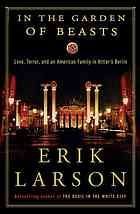
In the Garden of Beasts Love, Terror, and an American Family in Hitler's Berlin
The best-selling author of Devil in the White City documents the efforts of first American ambassador to Hitler's Germany William E. Dodd to acclimate to a residence in an increasingly violent city where he is forced to associate with the Nazis while his daughter pursues a relationship with Gestapo chief Rudolf Diels.
Reviews
halfmoon@halfmoon
Sarah E@booksgalore
Maddie@maddie
Tracey O’Rourke@simiavus
Wynn Netherland@wynn
Trish @trishbovell
Jeni Enjaian@jenienjaian
Anna Adams@anna_adams_writer
Ben Nathan@benreadssff
Heather Killeen@hturningpages
Georgia Adams@georgia308
Howard Greller@heshiegreshie
Ally Perkins@luchalibro
Francine Corry@booknblues
Preben T. A. Arentoft@agentangelo
John Bush@fjbiv
Isabella Agostino@bellaray
Andrew Reeves@awreeves
Ryan Mateyk@the_rybrary
Kevin Owens@ko2111
Jayme Cochrane@jamesco
Kaycee@kaycee
Jason Marder@jason_marder
Pierke Bosschieter@pierke